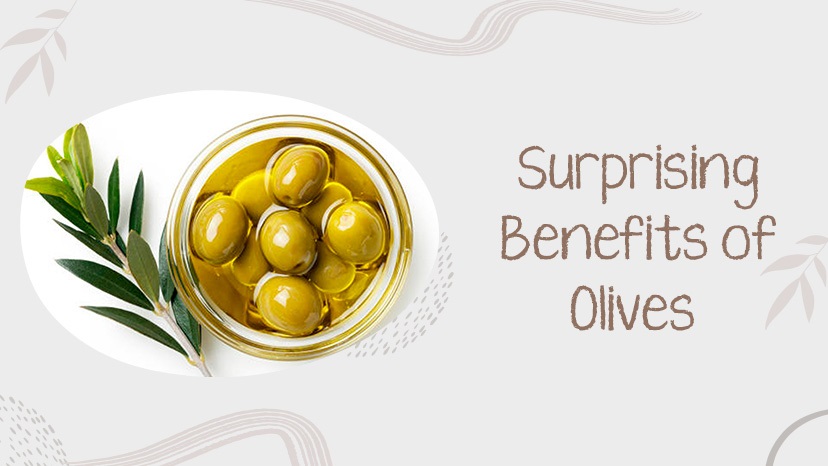Health Benefits of Olives – 10 Science‑Backed Reasons to Eat Them
Olives have been a cornerstone of the Mediterranean diet for centuries, revered for their flavor and powerful nutritional profile. But beyond being a tasty snack or salad topping, olives pack a punch when it comes to health benefits. In this 2025 guide, explore 10 evidence-based reasons to make olives a part of your daily routine.
1. Antioxidant Power from Polyphenols
Olives are rich in antioxidants like oleuropein, hydroxytyrosol, and tyrosol. These polyphenols combat oxidative stress, reduce inflammation, and help prevent cell damage—supporting long-term wellness and protection against chronic disease.
2. Promote Heart Health with Monounsaturated Fats
Olives are loaded with oleic acid, a heart-healthy fat that can help reduce LDL (bad cholesterol), increase HDL (good cholesterol), and lower blood pressure. Combined with vitamin E, these fats protect the heart and blood vessels from oxidative stress.
3. Support Brain Function
Polyphenols found in olives not only protect brain cells from damage but may also support memory and learning. Early research links olive consumption with reduced risk of cognitive decline and improved mental clarity.
4. A Good Source of Fiber and Digestive Aid
With 1–3 grams of dietary fiber per 100 grams, olives contribute to digestive regularity and satiety. Some types, especially fermented olives, may even offer probiotic benefits that support gut health.
5. Rich in Vitamin E & Skin Benefits
Vitamin E in olives acts as a powerful antioxidant that protects skin from UV damage, slows signs of aging, and supports collagen production. Eating olives regularly may help maintain healthy, glowing skin.
6. Anti‑Inflammatory and Cancer‑Protective Effects
Compounds like oleocanthal have anti-inflammatory effects similar to ibuprofen. These properties may help reduce inflammation in the body and provide protective effects against certain types of cancer.
7. Help Regulate Blood Sugar & Metabolic Health
Olives help maintain stable blood sugar levels by slowing carbohydrate absorption and improving insulin sensitivity. This makes them a smart choice for people managing blood sugar or at risk for diabetes.
8. Aid in Healthy Weight Management
Thanks to their fiber and healthy fat content, olives are a satisfying snack that supports appetite control. They help you feel full longer, which can reduce overall calorie intake and support healthy weight goals.
9. Support Bone Health & Potential Anti‑Aging
Some studies suggest that the antioxidants and phenolic compounds in olives may help reduce bone loss and support long-term bone density—especially important as we age.
10. Antibacterial & Gut‑Friendly Properties
Olives contain compounds that inhibit harmful bacteria such as Helicobacter pylori, which is linked to stomach ulcers. Fermented olives may also help restore healthy gut flora through natural probiotics.
How Many Olives Should You Eat Daily?
Experts generally recommend about 7–10 olives per day, which equals one tablespoon of olive oil. This portion delivers beneficial nutrients without excessive sodium. If you’re concerned about salt, rinse brined olives or choose low-sodium varieties.
Best Ways to Add Olives to Your Diet
- Add to salads or Mediterranean grain bowls
- Mix into pasta, couscous, or quinoa dishes
- Use in omelets or savory tarts
- Blend into tapenades or spreads for toast
- Serve with cheese, nuts, or fruit for a balanced snack
FAQs – Quick Answers to Common Questions
Q: Are black olives healthier than green olives?
Black olives often contain more iron and slightly higher antioxidant levels. Both types are healthy; the best choice depends on your nutrient needs and taste preference.
Q: Can olives raise your sodium levels?
Yes, especially canned or jarred olives. Opt for low-sodium varieties or rinse them before eating to reduce salt intake.
Conclusion
Olives are more than just a savory treat—they’re a powerhouse of antioxidants, heart-healthy fats, vitamins, and gut-friendly fiber. Just a small serving each day can promote overall wellness, support digestion, protect your heart, and even give your skin a glow. Whether you enjoy them as a snack or incorporate them into meals, olives are a simple yet powerful step toward a healthier lifestyle.
Sea Moss Benefits
Sea Moss, a nutrient-rich seaweed, offers numerous health benefits. Packed with vitamins, minerals, and antioxidants, it supports overall wellness. One of the key Sea Moss benefits is its ability to improve digestion, thanks to its high fiber content. It also promotes skin health by providing essential nutrients like Vitamin C and collagen. Additionally, Sea Moss benefits the immune system, boosts energy, and supports thyroid function due to its rich iodine content. Incorporating Sea Moss into your diet can lead to improved vitality, making it a superfood for those seeking natural, holistic health benefits.
How to Balance Hormones Naturally
Learn How to Balance Hormones Naturally through simple lifestyle changes and holistic approaches. Start by prioritizing a nutritious diet rich in whole foods, including plenty of fruits, vegetables, and healthy fats. Regular exercise, such as yoga or brisk walking, can also help regulate hormone levels and reduce stress. Adequate sleep is crucial; aim for 7-9 hours per night. Consider incorporating adaptogenic herbs like ashwagandha or maca into your routine to support hormone balance. Lastly, manage stress through relaxation techniques like meditation or deep breathing. By adopting these natural methods, you can promote hormonal harmony and overall well-being.





